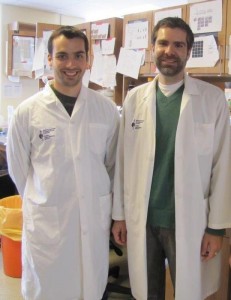
Drs. Desnoyers and Lewis are working to understand how breast cancer cells can move throughout the body. Breast cancer becomes more aggressive when normal breast cells change to become invasive by a process called epithelial-to-mesenchymal transition (EMT). Following EMT, breast cancer cells can move throughout the body and spread the tumor, an event known as metastasis. In recent years, small molecules called miRNA have been shown to be important in the regulation of EMT and the formation of metastases. Given that miRNAs are fairly easy to detect from biological fluids, they are currently employed as cancer biomarkers.
Drs. Desnoyers and Lewis want to characterize the way these miRNAs contribute to EMT to provide a better understanding of how breast cancer metastasis is regulated, with the goal of identifying novel miRNAs involved in the regulation of EMT and breast cancer metastasis.
Through their research, Drs. Desnoyers and Lewis hope to gain a better understanding of EMT and the metastatic process, which may lead to the identification of novel therapeutic targets for the treatment of metastatic breast cancer. In addition, the novel miRNAs that they identify in their study could be suitable biomarkers to help in the early detection of metastatic breast cancer.
Dr. Guillaume Desnoyers and Dr. Stephen Lewis at the Atlantic Cancer Research Institute in Moncton, New Brunswick received funding from the Breast Cancer Society of Canada through a partnership with the QEll Foundation and the Beatrice Hunter Cancer Research Institute.



